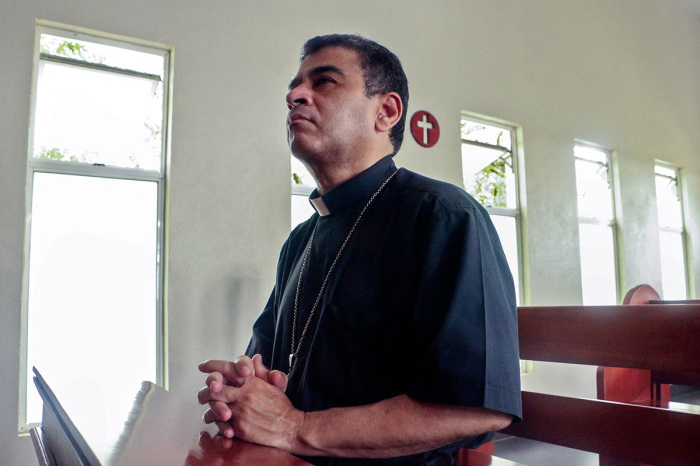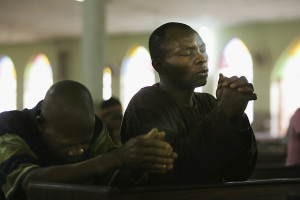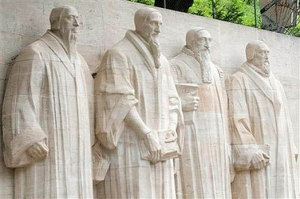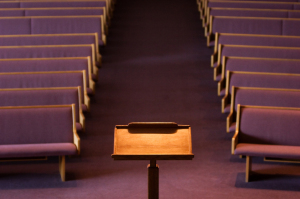Nicaraguan Bishop Rolando Álvarez released from prison, exiled to the Vatican

A Nicaraguan bishop imprisoned for denouncing the government's human rights violations against the Catholic Church and its members was among over a dozen religious leaders released and handed over to Vatican authorities.
The Nicaraguan government released Bishop Rolando Álvarez of Matagalpa and 18 other imprisoned clergy members as part of a negotiation with the Vatican. Government officials confirmed the releases, which were first reported by local media, according to Vatican News.
All except one arrived in Rome on Sunday and were welcomed as "guests of the Holy See." The other remained in Venezuela.
Álvarez was sentenced to 26 years in prison last February after he was convicted of "undermining national integrity" following a trial that he did not know was going to happen.
The bishop was initially barred from celebrating mass and imprisoned in his residence in August 2022 before he was arrested and later held in prison.
The clergy members were arrested amid a crackdown on the Catholic Church by Nicaraguan President Daniel Ortega and his regime. The president accused the clergy of supporting mass protests in 2018 that called for his resignation, which he claims was a plot to overthrow him.
The Catholic Church became a target of the Nicaraguan government in April 2018 amid a period of civil unrest due to the country's economic conditions. Church officials accused the government of religious persecution as religious leaders and places of worship faced attacks.
Catholic clergy provided shelter and aided the protestors demanding economic reforms and the resignation of President Ortega, prompting the president to use the government to take action against clergy members, worshipers and Catholic organizations.
Álvarez, who called for the Catholic Church to act as a mediator in 2018, was prohibited from leaving his home on Aug. 4, 2022, and celebrating mass. The bishop was detained for 15 days alongside seminarians, priests and a cameraman before the police arrested Álvarez without a warrant and placed him under house arrest.
He was found guilty of "undermining national integrity" and "propagation of false news." He was also found guilty of "aggravated obstruction of functions" and "disobedience of contempt for authority." The charges were related to sermons Álvarez delivered that accused the Nicaraguan government of human rights violations.
Álvarez was stripped of his nationality and citizenship rights and was later sentenced to 26 years and four months in prison and fined almost $5,000.
In November, the U.S. House of Representatives Foreign Affairs Subcommittee on Global Health, Global Human Rights and International Organizations held a hearing titled "An Urgent Appeal to Let Bishop Álvarez Go."
Two of the witnesses were exiled prisoners of conscience who shared their stories to advocate for the bishop's release. The names of the witnesses were concealed for safety reasons.
According to the witness referred to as Exiled Prisoner of Conscience #2, he was arrested without a warrant, stripped naked and subjected to multiple interrogations about Álvarez. The interrogators threatened to harm the witness' family to pressure him to declare that Álvarez was part of an organization promoting a coup d'état against Ortega.
The unnamed witness was among 222 other people, most of them political prisoners, members of human rights organizations and priests, who were exiled for defending human rights.
The other unnamed witness, referred to as Exiled Prisoner of Conscience #1, testified that he was arrested in the street by two police officers and six members of the security troops. He testified that his interrogators asked him about Álvarez and how much money he supposedly received from the U.S. government and the European Union.
"I was accused of undermining the dignity of the state and of Nicaragua, of spreading false news," the exiled witness said.
Rep. Chris Smith, R-N.J., a senior House Foreign Affairs Committee member, called for Ortega to release Álvarez from prison and allow him to travel to the United States or the Vatican. In early July, the newspaper Divergentes reported that Álvarez met with a representative of the Vatican who tried to persuade him to be exiled to Rome, which he reportedly refused.
During his opening remarks, Smith highlighted the Nicaraguan government's treatment of people of faith, urging the international community not to "turn a blind eye." The lawmaker noted that prisoners have had their requests for Bibles denied, and he pointed to Nicaragua's expulsion of the Missionaries of Charity — an order founded by Mother Teresa — as another religious freedom attack.
"The regime has closed Catholic radio stations and universities, obstructed access to places of worship, banned public Way of the Cross processions, and frozen the bank accounts of hundreds of Catholic institutions," he said.
Samantha Kamman is a reporter for The Christian Post. She can be reached at: samantha.kamman@christianpost.com. Follow her on Twitter: @Samantha_Kamman





























